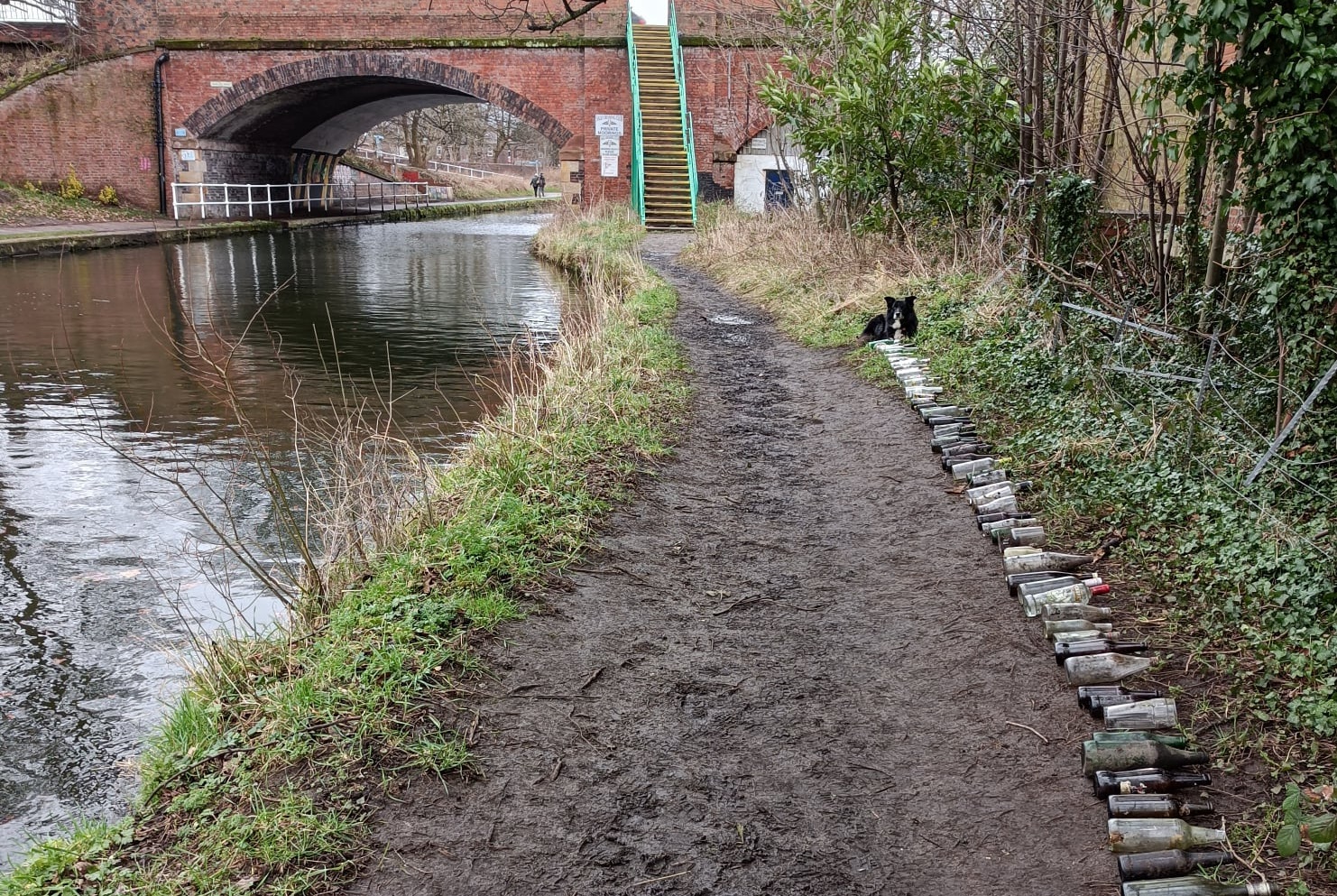'Never look the other away again' in battle to protect Altrincham's waterways
“It’s just a disgusting way to treat the river,” Pete said. “It was here first before us, it’s disgusting.”
“There’s quite a lot of pong in the River Mersey.”
So says Pete Miners, a volunteer who spends his time clearing rubbish from waterways around Trafford and has so far recovered thousands of glass bottles. Pete, who completed most of his searching with his beloved late dog, says he has found a staggering 20,150 glass bottles during recent years searching locations around south Manchester.
Much of this is washed up in three locations having travelled from upstream, having been dumped by individuals elsewhere. But there’s another, less seen problem that is having a devastating effect on the area’s waterways.
Last year, Trafford Council heard of “stench and filth” emerging from the River Mersey with one councillor describing the “smoking gun” of disposable wipes being visible after discharges.
During Pete’s, trips which include walking at locations such as Bridgewater Canal, within parks, and along the banks of the River Mersey, a common sight after sewage discharge is sanitary products. He said: “The sewage works is just upstream near junction 7. Like everywhere else, when there’s a spate of rain, they just let the sewage go untreated into the water.”
Pete, who now picks litter as part of Trafford Wildlife Volunteers, says there’s a lack of interest in tackling the issue “from everyone from the Prime Minister down” and that others have pulled out road signs, traffic cones, plastic barriers, trolleys, ironworks and so much more from the water.
“It’s just a disgusting way to treat the river,” Pete said. “It was here first before us, it’s disgusting.” While all that can be seen, the sewage issue represents a different problem.
“I just feel for kids who have got to go play down there. Especially when it’s hot, it gets loads of people down there. It’s not just dogs, there’s people in the river. It’s not right really.”
The problem with Trafford’s waterways falls under a wider problem of record breaking sewage dumping and a fall in monitoring standards. Critics of the previous government’s handling of the situation have said water companies have been allowed to “mark their own homework” due to the lack of independent testing.
Government data for 2023 showed a 54% increase in the number of sewage spills – from 301,091 spills in 2022 to 464,056 in 2023. The average number of spills per overflow was 33, compared with 23 in 2022, while the total 3,606,170 hours of monitored spills was more than double the previous year.
A significant factor in this was 2023 being the wettest year in the past decade and an increased number of overflows being assessed. However, the Environment Agency has pledged to crack down on water companies for the atrocious results.
It said: “Ultimately, water companies have a very long way to go. They need to invest more in tackling storm overflow pollution. Any water companies in breach of their permits are acting illegally and must act urgently to address any non-compliance.
“We will always seek to hold those responsible for environmental harm to account. If we identify illegal discharges from storm overflows, we investigate them, and action is taken in line with our Enforcement and Sanctions Policy.”
That was seen earlier this week when regulator Ofwat opened an enforcement case into United Utilities as part of its ongoing investigation into how companies manage their wastewater treatment works and networks. Notices were also served on three other firms to gather evidence, meaning every single water and wastewater company in the country is now facing investigation.

Bottles lined up next to Brooklands Metrolink
Ofwat said the opening of the cases follows detailed analysis of information on companies’ environmental performance and data about how often these companies spill from storm overflows. The regular said there are concerns these companies “may not be fulfilling their obligations to protect the environment and minimise pollution” but said the opening of cases does not automatically imply a breach of legal obligations.
Fresh hope for action locally also arrived earlier this month courtesy of a Supreme Court ruling that the Manchester Ship Canal’s owners can sue United Utilities over sewage dumping.
In the latest step of a decade-long battle, a panel of Supreme Court judges ruled the company was legally able to make a claim for damages. They wrote: “[T]he owner of a canal or other watercourse has a property right in the watercourse, including a right to preserve the quality of the water.
“That right is protected by the common law. The discharge of polluting effluent into a privately-owned watercourse is an actionable nuisance at common law if the pollution interferes with the owner’s use or enjoyment of its property”
A canal company spokeswoman said they were pleased with the decision, while the water firm said it was "considering the implications of the Supreme Court’s ruling and the clarification of the circumstances in which private owners could bring proceedings in respect of discharges.
Among those calling for change is the Manchester Friends of the Earth group which plans to join Extinction Rebellion’s peaceful protest outside the United Utilities AGM in Warrington on Friday.
Catherine Thomson, Manchester Friends of the Earth coordinator, said: "The sewage scandal has seen paltry fines long after the harm has been caused to our environment, wildlife and potentially to people's health.
"Water company bosses and shareholders have made fat bonuses and dividends showing how the polluter doesn't really pay. Yet they are pushing for even weaker regulation and high water bills for customers to subsidise and make up for their own past failure to invest enough in fixing sewers and upgrading water pipes.
“The new Environment Secretary Steve Reed's five core priorities include cleaning up Britain’s rivers, lakes and seas, ensuring recovery of the nation's depleted nature, and protecting communities from the dangers of flooding.
“None of these will happen if polluters, including water and sewerage companies, continue to hike charges to water bill payers while arguing they can impinge on people's health and property rights."
Locally, the data on sewage dumping makes equally bleak reading. At Timperley Brook alone, almost 1,500 hours of sewage dumping was recorded while figures from the Liberal Democrat group are 12 times this for the wider Trafford area.
Among those welcoming increased efforts to tackle the shoddy standards of water companies is new Altrincham and Sale West MP Connor Rand. He told The Altrincham & Sale Lead: “For me personally, the state of our natural environment is something that really concerns me and everyone is aware of the scale of the problem we’ve had.
“It was an issue so many people wanted to talk about. I think it’s an example of government failure to regulate water dumping and control the sewage crisis.
He added: “We should all want Altrincham and Sale West to be a good place to live and the scale of sewage dumping in the local area is a real problem. For people going on a walk by the brook it’s deeply unpleasant to know how much sewage is in the water.”
According to Cllr Shaun, the Lib Dem group leader for Trafford, the pollution is visible in the water and has a deadly effect on wildlife.
He said: “Locally, there was 18,000 hours of sewage dumping affecting the waterways last year. It’s absolutely disgusting when you think of that length of time.
“People really care because this is on their doorsteps, literally in some cases.”
Cllr Ennis argues one way to tackle the issue is by implementing a ‘sewage tax’ to punish water companies who fail their duties. The proceeds of this would then be used to bolster the Environment Agency and allow more independent water testing to take place.
“You can see the loss of biodiversity around Fairywell Brook. It has a huge housing estate on one flank, it runs across that and a playing field that is regularly used by under 11 football teams and the like.
“If you walk along, you can see the water quality is deteriorating, where the wildlife is deteriorating. It’s really upsetting.”
The issue of testing and updating data affects not only the waterways but also homes. Those living in the Timperley area have become accustomed to flooding affecting them twice a year despite local data suggesting there is no risk of it happening. The degradation of water courses means many fear it is raw sewage coming into their homes during such incidents.
Cllr Ennis said: “I think it is a two-pronged issue. There’s the sewage issue nationally and locally, we’ve also got the issue of flash floods which affect the south of Trafford. Those cuts to the Environment Agency have contributed because these services are working on outdated modelling because they can’t keep up.

A man runs next to Altrincham Canal
“If that data is wrong, what else is wrong? As Liberal Democrat councillors we conducted our own, slightly amateur, tests to raise the issue and found e-coli in the water.
“We wanted to get their attention but the response was completely non-existent because the Environment Agency is so under-resourced.”
Calls for greater transparency have been echoed by the Information Commissioner's Office (ICO) which this week wrote to water companies to warn them they “must put transparency first if they want to rebuild public trust”. The public body, which is sponsored by the Department for Science, Innovation and Technology, is responsible for "upholding information rights in the public interest, promoting openness by public bodies and data privacy for individuals".
In a letter sent this week, information commissioner John Edwards said: “The public has no choice but to use our water companies, therefore these companies should ensure they have every confidence in doing so. The current concerns about sewage pollution have dented this confidence, so we’re calling on these companies to be open about their activities to help rebuild this trust. It’s both their responsibility and their legal obligation.”
Attention now turns to the new Government’s efforts to clamp down on water companies. It has been made an early priority by Prime Minister Keir Starmer and Secretary of State for Environment, Food and Rural Affairs, Steve Reed and was discussed in yesterday’s King’s Speech which outlined plans for the coming months.
The planned Water (Special Measures) Bill aims to strengthen regulations on water companies while giving powers to levy criminal liability on bosses for pollution. It would also ban bonuses when environmental standards aren’t met and allow automatic fines for firms which pollute waterways.
Outlining the desire to tackle the issue, Mr Reed earlier said: “We will never look the other way while water companies pump sewage into our rivers, lakes and seas. This unacceptable destruction of our waterways should never have been allowed, but change has now begun so it can never happen again.
He said “significant steps” would be taken to clean up the water industry to “cut sewage pollution, protect customers and attract investment to upgrade its crumbling infrastructure”.
Mr Reed added: “That change will take time. Over the coming weeks and months, this Government will outline further steps to reform the water sector and restore our rivers, lakes and seas to good health.”
A United Utilities spokesperson said: “We’re proud of the role we have played in improving the health of the River Mersey. Since 1985, as a key partner in the Mersey Basin Campaign, we have invested more than £3 billion in our treatment works and sewer systems to help improve the water quality.”
The Lead is now on Substack.
Become a Member, and get our most groundbreaking content first. Become a Founder, and join the newsroom’s internal conversation - meet the writers, the editors and more.





